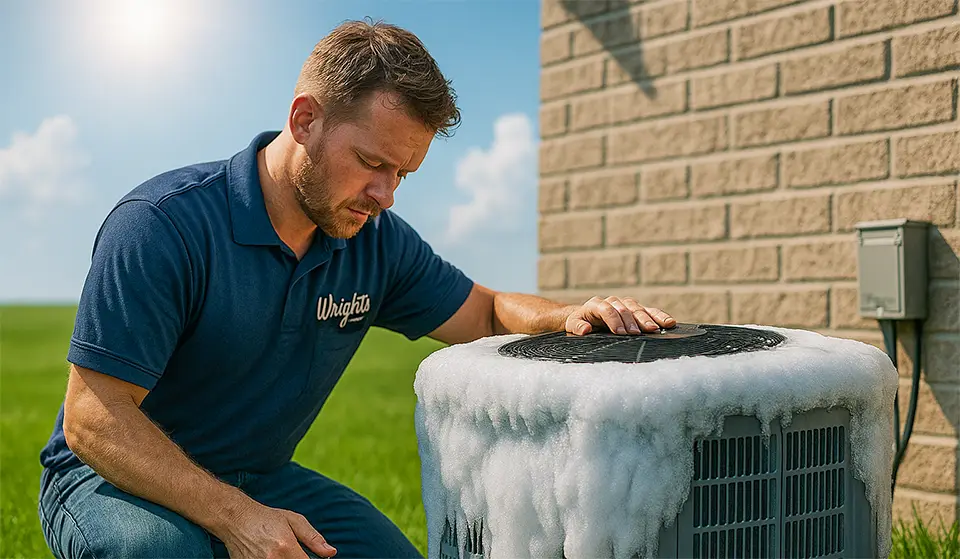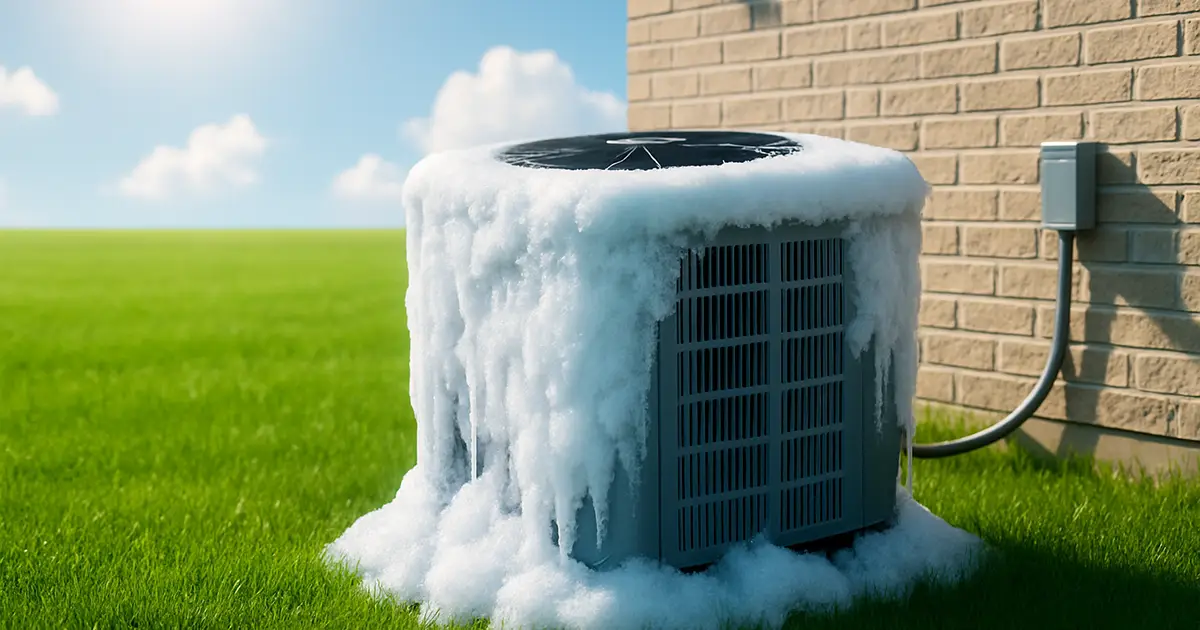You don’t expect to walk outside in 95-degree heat and discover that your air conditioner is coated in ice. But for many Texas homeowners, a frozen AC unit in the middle of summer is a reality (and an annoying one at that).
Most people associate “frozen” with winter problems, but an AC freeze-up can happen any time of year. Understanding why it happens, how to safely address it, and how to prevent it from happening again can keep your home cool and your repair bills low.
Why AC Units Freeze in Hot Weather
Even during blazing Texas summers, the components inside your AC unit can get cold enough to freeze if something isn’t working correctly. Here are the most common culprits:
Low Refrigerant Levels
Refrigerant allows your AC system to absorb heat and cool your home. When refrigerant levels are too low because of a leak, the pressure drops inside the coils. That pressure drop allows moisture in the air to freeze inside your unit.
You may hear a hissing noise, feel weak cooling, or notice ice forming on the lines. The longer it goes unnoticed, the more ice builds up, making it harder for your system to function. Handling refrigerant is hazardous and requires certification, so it’s best to call in a professional if you suspect a leak.
Poor Airflow
If warm air can’t circulate through the system, your evaporator coils won’t stay at the right temperature. That’s when things start to freeze.
The most common reason is a dirty air filter. If it’s clogged, warm air gets trapped, and cold air builds up around the coils until it turns to ice. Other airflow issues can stem from:
- Closed or blocked vents
- Collapsed or leaking ductwork
- Furniture obstructing return vents
- Pet hair, dust, or pollen overload
Without steady airflow, your AC will overwork itself trying to cool your space—and end up doing the opposite.
Dirty or Damaged Coils
Coils are the heart of the heat exchange process. If they’re coated in grime, they can’t absorb heat from your indoor air. That heat backs up, and condensation freezes along the coils.
It’s easy for coils to collect dust, especially if filters aren’t changed regularly. Sometimes, damage or corrosion can also affect their performance. When coils don’t work correctly, your entire cooling cycle suffers.
Fan or Thermostat Problems
If your blower fan isn’t running at the right speed, it can’t circulate air through the system. That leads to condensation forming in the wrong places and freezing up fast.
A malfunctioning thermostat can also cause trouble. If it’s set too low or misreading the temperature, it may run the system when it shouldn’t, leading to unnecessary freezing. A smart thermostat can help by better regulating usage and preventing low-temp operation during off-hours.
Clogged Condensate Drain Line
Your AC produces moisture as it cools the air, and that water needs somewhere to go. The condensate drain line handles this task… until it doesn’t.
When the drain line gets clogged by algae, dirt, or mold, water can back up into the unit. Once it hits cold surfaces, it freezes. Over time, the blockage worsens, and the buildup can damage your system or even leak into your home.
Aging or Faulty Components
An AC unit nearing the end of its lifespan is more likely to freeze. As components wear down, the system can’t maintain its normal balance. Worn-out fans, damaged wiring, or even dirty electrical contacts can throw everything off.
If you’re scheduling frequent repairs or noticing a new freeze-up every summer, it might be time to consider a replacement.
How to Safely Unfreeze Your AC
If your AC is already frozen, here’s what to do:
- Step 1: Shut It Down. Turn off the system entirely at the thermostat and the breaker. Running it while frozen puts strain on the compressor, one of the most expensive components to replace.
- Step 2: Let It Thaw. Leave the system off for several hours—up to 24 if needed. You can speed up the process with a fan setting or, carefully, a hairdryer on low heat aimed at the ice (never use sharp objects to chip it off).
- Step 3: Check the Filter and Vents. Replace your air filter if it’s dirty. Walk through your home and open all vents. Move furniture and curtains away from return registers and confirm no air is blocked.
If your system restarts normally after these steps and begins cooling your home, the issue may have been airflow-related. But if freezing happens again, it’s time to call your friendly pros at Wright’s Air.
Not every freeze-up is a DIY fix. If you’re noticing repeat issues, reach out to us and one of our licensed HVAC technicians will stop by to check it out. Look for these warning signals:
- Ice returns after filter changes and vent checks
- Unusual noises (clicking, hissing, or grinding)
- Reduced cooling or system shutdowns
- Water pooling around the unit
- Leaking refrigerant (especially if you smell something chemical)
Wright’s Air can inspect your refrigerant pressure, blower motor, coils, wiring, and thermostat calibration. Getting ahead of the problem can prevent a complete system breakdown.
How to Prevent a Frozen AC Unit
Freezing isn’t just fixable… it’s preventable. Here’s how you can stop it from happening again:
Change Your Air Filter Monthly
Most Texas homeowners should replace their air filters every 30 days during peak usage. If you have pets or allergies, change it even more often. A clean filter supports proper airflow and better cooling.
Schedule Annual AC Tune-Ups
A professional tune-up can catch minor issues before they cause a freeze-up. At Wright’s Air, we recommend spring maintenance appointments to prepare your system for the Texas heat.
During a maintenance visit, our team:
- Checks refrigerant pressure
- Cleans and inspects coils
- Tests blower performance
- Clears the condensate drain
- Inspects the thermostat
- Looks for any electrical wear or damage
It’s one of the smartest investments you can make in home comfort.

Keep Air Vents Clear
Never close more than 20% of your home’s air vents, even in unused rooms. Your system needs return airflow to operate correctly. Regularly walk through your house and clear any obstructions from vents and registers.
Install a Smart Thermostat
A smart thermostat can prevent you from overcooling your system, especially on cool nights or rainy days. Many models include reminders for filter changes and can even alert you to irregular temperature patterns.
Keep an Eye on the Drain Line
Each year, inspect the drain line that exits near your outdoor unit. Schedule a professional cleaning if you see water backing up or notice any green or black growth. Some homeowners use a small amount of white vinegar monthly to prevent clogs.
Don’t Let Your AC Ice Over This Summer
Texas summers are hot enough… you don’t need your AC working against you. A frozen air conditioner might seem like a strange summer issue. Still, it’s more common for homeowners across Greenville than you’d think.
Whether it’s a clogged filter, a hidden refrigerant leak, or an aging component, Wright’s Air is here to help. Our experienced technicians provide fast, reliable repairs and seasonal maintenance to keep your system running smoothly all year long.
Stop the freezing before it starts. For expert service in Greenville and surrounding areas, contact us today at (903) 455-5662.

